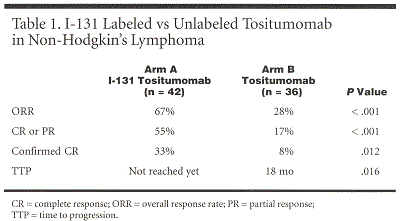I-131 Tositumomab More Effective Than Unlabeled Antibody in Relapsed or Refractory NHL
ANN ARBOR, Michigan-Tositumomab with radioactive I-131 attached (Bexxar) is more effective than the unlabeled antibody in relapsed or refractory CD20-positive non-Hodgkin’s lymphoma (NHL), according to Mark S. Kaminski, MD. Dr. Kaminski reported data from a randomized, open-label, multicenter study comparing the two formulations at the 43rd Annual Meeting of the American Society of Hematology. He is professor of internal medicine at the University of Michigan Comprehensive Cancer Center in Ann Arbor.
ANN ARBOR, MichiganTositumomab with radioactive I-131 attached (Bexxar) is more effective than the unlabeled antibody in relapsed or refractory CD20-positive non-Hodgkin’s lymphoma (NHL), according to Mark S. Kaminski, MD. Dr. Kaminski reported data from a randomized, open-label, multicenter study comparing the two formulations at the 43rd Annual Meeting of the American Society of Hematology. He is professor of internal medicine at the University of Michigan Comprehensive Cancer Center in Ann Arbor.
Phase II Study
This phase II study was undertaken because evidence of efficacy seen in clinical trials of unlabeled anti-CD20 antibodies raised questions about whether the radioactive label might add toxicity without additional benefit. Lymphoma regression had also been observed after imaging doses of radiolabeled tositumomab. "Since the radiation provided by the imaging dose is unlikely to provide a therapeutic effect, a clinical trial was performed to determine the relative contribution of the radioisotope and antibody to both the efficacy and toxicity of I-131 tositumomab therapy," Dr. Kaminski said.
This report included data for 78 patients with a median follow-up of 25 months. Patients were randomized either to tositumomab and I-131 tositumomab (arm A) or to unlabeled tositumomab (arm B). The patients in this study had a median of two prior chemotherapies and had disease that progressed within 12 months of their last chemotherapy. Patients randomized to unlabeled tositumomab (arm B) could cross over and receive treatment with the hot antibody once their disease had progressed.
Median age was 55 years (range: 28-85), 58% of patients were males, 88% were stage III/IV, 40% had elevated lactate dehydrogenase, and 41% had a lymph node larger than 5 cm. The original NHL was follicular in 97% of patients, and 17% had experienced transformation to an aggressive histology.
Radioiodide Component Provides Benefit
The results show that the radiolabeled antibody is clearly more effective and produced significantly greater overall response rate, confirmed responses, confirmed complete responses (CR), and time to progression (see Table 1). "The median duration of confirmed responses for the tositumomab/I-131 tositumomab-treated patients has not been reached, and for the tositumomab treated patients it was 18 months," Dr. Kaminski said.

After disease progression, 19 patients crossed over to I-131 tositumomab therapy. This produced responses in 17 (89%), confirmed response in 13 (68%), and a confirmed complete response in 8 (42%). Thirteen patients did not cross over. Eight of these had developed human antimouse antibodies, three had other therapy, one had no therapy, and one died.
"Hematologic toxicity was greater in the I-131 tositumomab patients, with a nadir at 4 to 6 weeks," Dr. Kaminski said. Among these patients, seven (17%) developed neutrophil counts of less than 500 cells/µL and two (5%) developed platelet counts of less than 10,000 cells/µL. Dr. Kaminski said that 21% of patients on arm A required supportive care.
"The radioiodide component of tositumomab/I-131 tositumomab therapy provides significant additional therapeutic benefit, with a higher overall response rate, more confirmed complete responses, and improved disease-free survival," Dr. Kaminski said. "We also found that crossover patients who had been unresponsive to the unlabeled antibody were highly responsive to I-131 tositumomab."